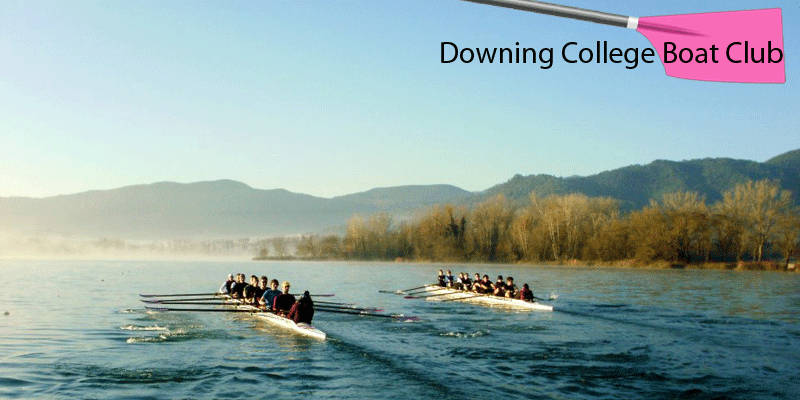
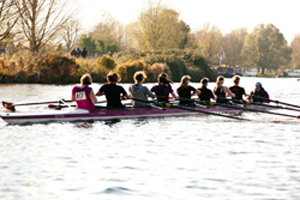
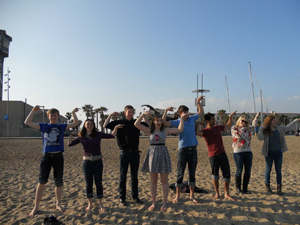
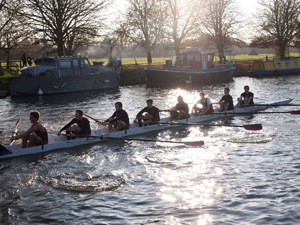
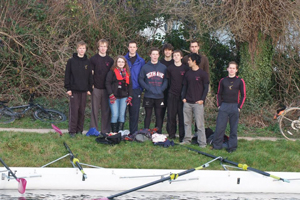
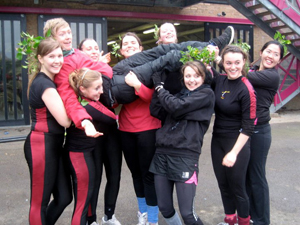
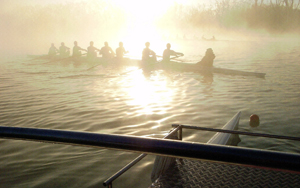
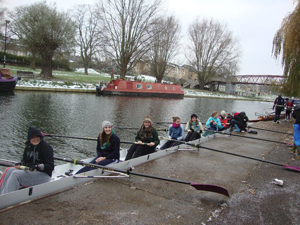
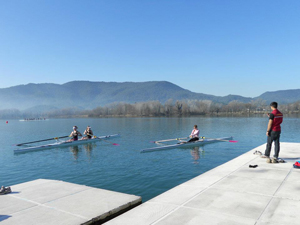
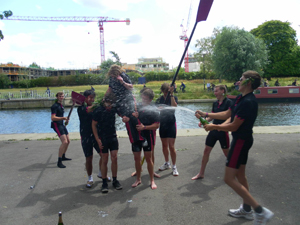
Novice FAQs
Not sure whether to have a go at rowing? Not sure what to expect or whether you'll fit in? Don't worry, you're not alone! Have a read below...
The only thing I know about rowing is from watching the Boat Race on television! Will I be able to pick it up from scratch?
Yes! The vast majority of people who start rowing at Downing will never have rowed before (this was true all of this years' Men's and Women's Captains, along with the three Lower Boats Captains) so you won't be alone. We teach you everything you need to know, starting with a few one-on-one sessions on ergos (rowing machines) and in small tubbing boats to make sure you have the basic skills and confidence before we put you on the river! Downing College Boat Club has some of the best facilities available in Cambridge as well as British Olympic rower, Ian Watson as our Boatman(!!!), so between us we should be able to help you with any problems. Come to the Freshers' Squash and have a go!
I have previous experience rowing for my school. Does that make me a Novice or could I be a senior?
Get in touch with either Brennen Heames (bh380@cam.ac.uk) or Rachel Franks (rcf42@cam.ac.uk) respectively the Men's and Women's Captains, for more information on the senior squad and they'll help you to decide which would be the best match for you. If you feel that neither group is a good fit for you then you could row casually. There are a number of students who have rowed previously but who don't row in set squads that you could get in touch with, and the Lower Boats Captains are happy to help match you up.
I've never been a sporty person. I have just about enough co-ordination to put one foot in front of the other without tripping up. I really want to give rowing a go. I just don't think I'll be very good at it...
Each year one or two people join DCBC who are already fit, competitive athletes who have decided to take on a new sporting challenge. And certainly there are plenty of keen sportspeople, even if they're not the next Steve Redgrave, who are interested in rowing as the quintessential Cambridge sport. However, many of us have a less-than-stellar background in the sports we played at school – if we ever repeat the kind of football matches played when on training camp in France and Spain over the past couple of years, you'll see what we mean. The mechanical side of rowing means you don't have to have the kind of incomprehensible genius it takes to perfectly time a shot, or make a ball curve – anyone can learn, and anyone can get good. If you're not particularly fit, rowing is THE best way to change that, or at the very least offset all the chocolate-eating that starts from your first essay and only gets worse. But most importantly, rowing is a team sport. That does require a kind of dedication that you might be wary of if you don't think of yourself as naturally sporty. However, at DCBC we make sure rowing is more than just a sport. Being out on the river is a pleasure of itself, and the club is a chance to socialise, meet new people, take time out of a hectic, book-filled schedule, and learn to excel at, or merely enjoy, something very new and different.
Everyone talks about rowing, but what about coxing? What does being a cox involve?
Coxes are the people who steer the boat in the right direction and give instructions to the rowers on what to do. However, it's not just about sitting back and yelling at other people to pull harder while you sit there being pulled along - coxing is a hard job! The Cam is a tricky river to manoeuvre and there's a great skill to be learned. As well as steering in the right direction, they need to provide information to the crew, make any necessary changes to optimise the speed, and inspire and reassure the rowers that the race (and the pain) is almost over! Great sportspeople need a kind of confidence and sharpness of mind to excel at what they do. Coxes need these qualities in spades, and the ability to direct and lead a crew through training and racing. It is understandable that if you are new to the rowing world you might think that putting yourself forward as a cox amounts to opting out of the ‘real' sport, but the coxes are a busy and integral part of any boat club. DCBC enjoyed great success last year, but the biggest pledge we all made to improve the club is to ensure our coxes receive quality coaching and really excel, so rest assured you will be very appreciated and in no way a less vital member of DCBC.
Do you really have to row at 6am in winter?
It's probably the least enjoyable parts of rowing but yes, sometimes rowing involves getting up early and when the weather isn't particularly nice. But we don't do it because we're crazy people who don't like our warm beds; it's just that the busy lifestyle of a Cambridge student means that the time when it's easiest to get 9 people who are free at the same time happens to be at stupid-o'clock. That said, having been awake for several hours with a couple of black coffees already under your belt does give you a perky edge when you're sat in 9am lectures surrounded by people still in their pyjamas. Let us assure you, however, if there's a choice between a 6am or an afternoon outing, we'll always let you have the lie-in!
Do I have to have Lycra to row in?
No, you don't have to have Lycra and most novice crews don't for the first term or so. It is, however more comfortable and practical to row in and when you pull up alongside your opponents before a race in matching gear you can always see the fear in their eyes.
Here's what kit we suggest until you decide whether Lycra is a good investment:
- Good quality trainers
- A thick pair of socks and several spare pairs (in case your feet are too small for the shoes in the boat)
- Leggings (Primark leggings are cheap and cheerful!)
- Tracksuit bottoms
- Several layers of t-shirts and vests (it's better to remove layers if you're too warm than be too cold with no spare clothes)
- A tight fitting fleece or jumper
- A tight waterproof jacket
- A pair of gloves (especially for coxes)
The emphasis is on layers and clothes that are tight so that they won't interfere with your movement or get caught on the seat. And ALWAYS bring lots of water.
I just read this whole FAQ and you didn't answer my question!
Email us! We'll be happy to help/reassure/educate you. lbcs@downingboatclub.co.uk